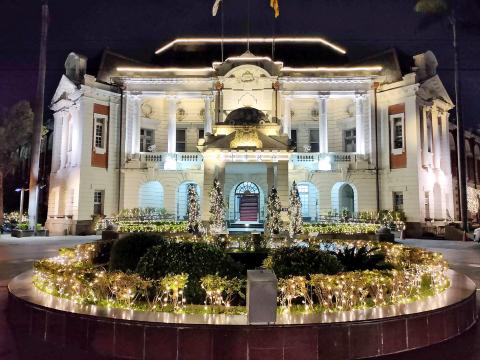The Taichung City Government on Tuesday said that it would not hand over the Taichung Prefectural Hall — which was built during the Japanese colonial era as the seat of government for what the Japanese called Taichu Prefecture — to the central government to become the second exhibition hall for the National Taiwan Museum of Fine Arts as previously agreed.
Taichung Prefectural Hall was one of five major prefectural halls constructed during the Japanese colonial era. It was designed by architect Matsunosuke Moriyama, as were the halls in Taipei and Tainan, which are now the Control Yuan and the National Museum of Taiwan Literature respectively.
Turning over the building to the central government without any compensation is unacceptable, Taichung Mayor Lu Shiow-yen (盧秀燕) said, adding that such a decision belittled the hall.

Photo provided by the Taichung City Government
The hall was supposed to be turned over after being renovated, she said, adding that the central government was providing NT$200 million (US$6.7 million) and the municipal government NT$300 million for the renovations.
The city government had received multiple complaints regarding the decision, which was made under former Taichung mayor Lin Chia-lung (林佳龍), Lu said.
Lin had previously signed an agreement with the Ministry of Cultural Affairs to turn over the hall and “upgrade” it to a national-level museum.
After the renovations, the hall would not completely be used for tourism, as the city government’s Urban Development Bureau, Transportation Bureau and Environmental Protection Bureau would remain in the building, Lu said.
Aside from maintaining a city government presence in the building, other portions of it would be repurposed for tourism or culture-related events, she said.
By maintaining the hall’s historic status, the municipality hopes to draw more tourists to West Central District (中西), Lu said.
Lu also said that the city government would help improve infrastructure in the area.

Alain Robert, known as the "French Spider-Man," praised Alex Honnold as exceptionally well-prepared after the US climber completed a free solo ascent of Taipei 101 yesterday. Robert said Honnold's ascent of the 508m-tall skyscraper in just more than one-and-a-half hours without using safety ropes or equipment was a remarkable achievement. "This is my life," he said in an interview conducted in French, adding that he liked the feeling of being "on the edge of danger." The 63-year-old Frenchman climbed Taipei 101 using ropes in December 2004, taking about four hours to reach the top. On a one-to-10 scale of difficulty, Robert said Taipei 101

Nipah virus infection is to be officially listed as a category 5 notifiable infectious disease in Taiwan in March, while clinical treatment guidelines are being formulated, the Centers for Disease Control (CDC) said yesterday. With Nipah infections being reported in other countries and considering its relatively high fatality rate, the centers on Jan. 16 announced that it would be listed as a notifiable infectious disease to bolster the nation’s systematic early warning system and increase public awareness, the CDC said. Bangladesh reported four fatal cases last year in separate districts, with three linked to raw date palm sap consumption, CDC Epidemic Intelligence

Taiwanese and US defense groups are collaborating to introduce deployable, semi-autonomous manufacturing systems for drones and components in a boost to the nation’s supply chain resilience. Taiwan’s G-Tech Optroelectronics Corp subsidiary GTOC and the US’ Aerkomm Inc on Friday announced an agreement with fellow US-based Firestorm Lab to adopt the latter’s xCell, a technology featuring 3D printers fitted in 6.1m container units. The systems enable aerial platforms and parts to be produced in high volumes from dispersed nodes capable of rapid redeployment, to minimize the risk of enemy strikes and to meet field requirements, they said. Firestorm chief technology officer Ian Muceus said

MORE FALL: An investigation into one of Xi’s key cronies, part of a broader ‘anti-corruption’ drive, indicates that he might have a deep distrust in the military, an expert said China’s latest military purge underscores systemic risks in its shift from collective leadership to sole rule under Chinese President Xi Jinping (習近平), and could disrupt its chain of command and military capabilities, a national security official said yesterday. If decisionmaking within the Chinese Communist Party has become “irrational” under one-man rule, the Taiwan Strait and the regional situation must be approached with extreme caution, given unforeseen risks, they added. The anonymous official made the remarks as China’s Central Military Commission Vice Chairman Zhang Youxia (張又俠) and Joint Staff Department Chief of Staff Liu Zhenli (劉振立) were reportedly being investigated for suspected “serious